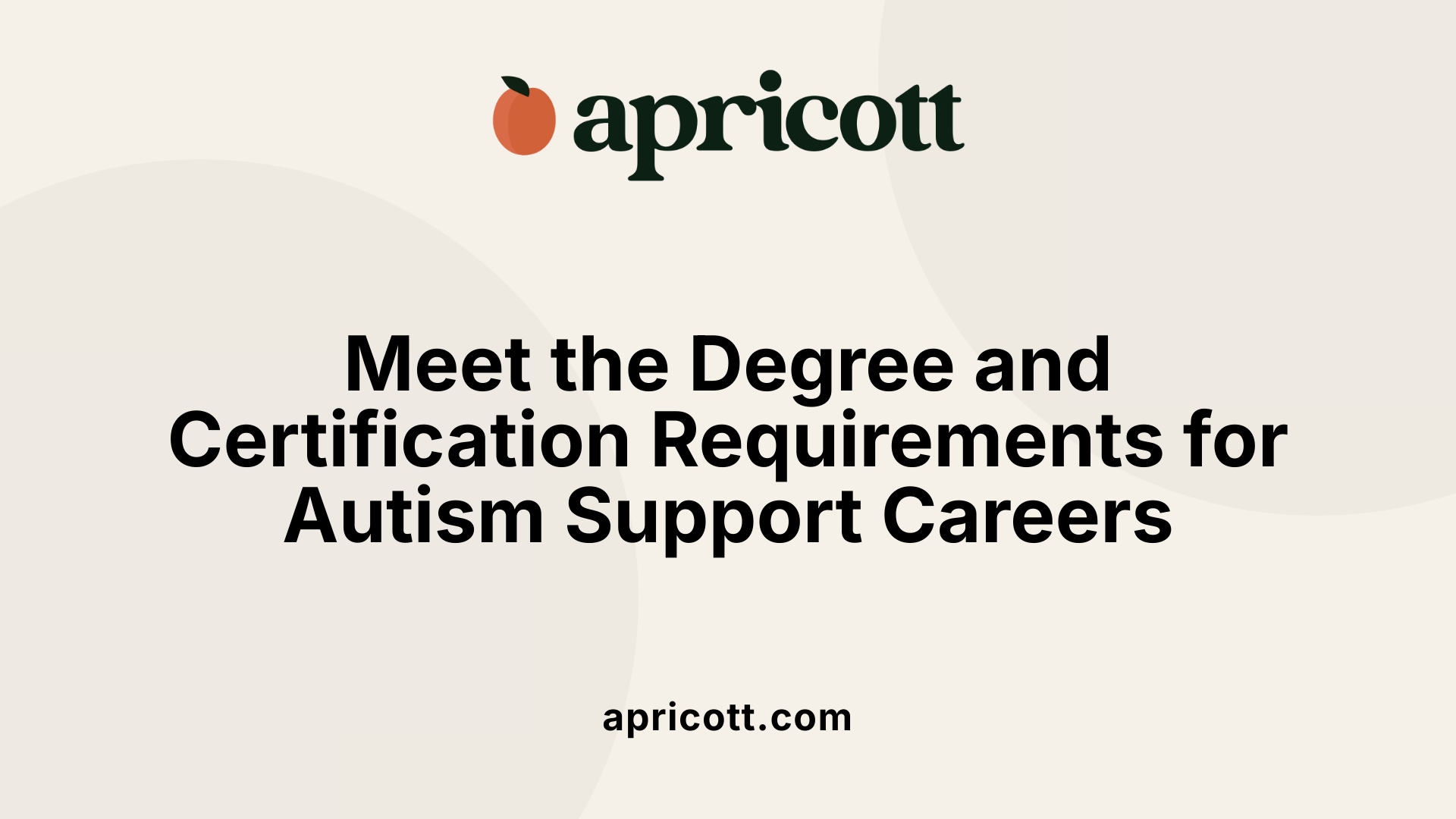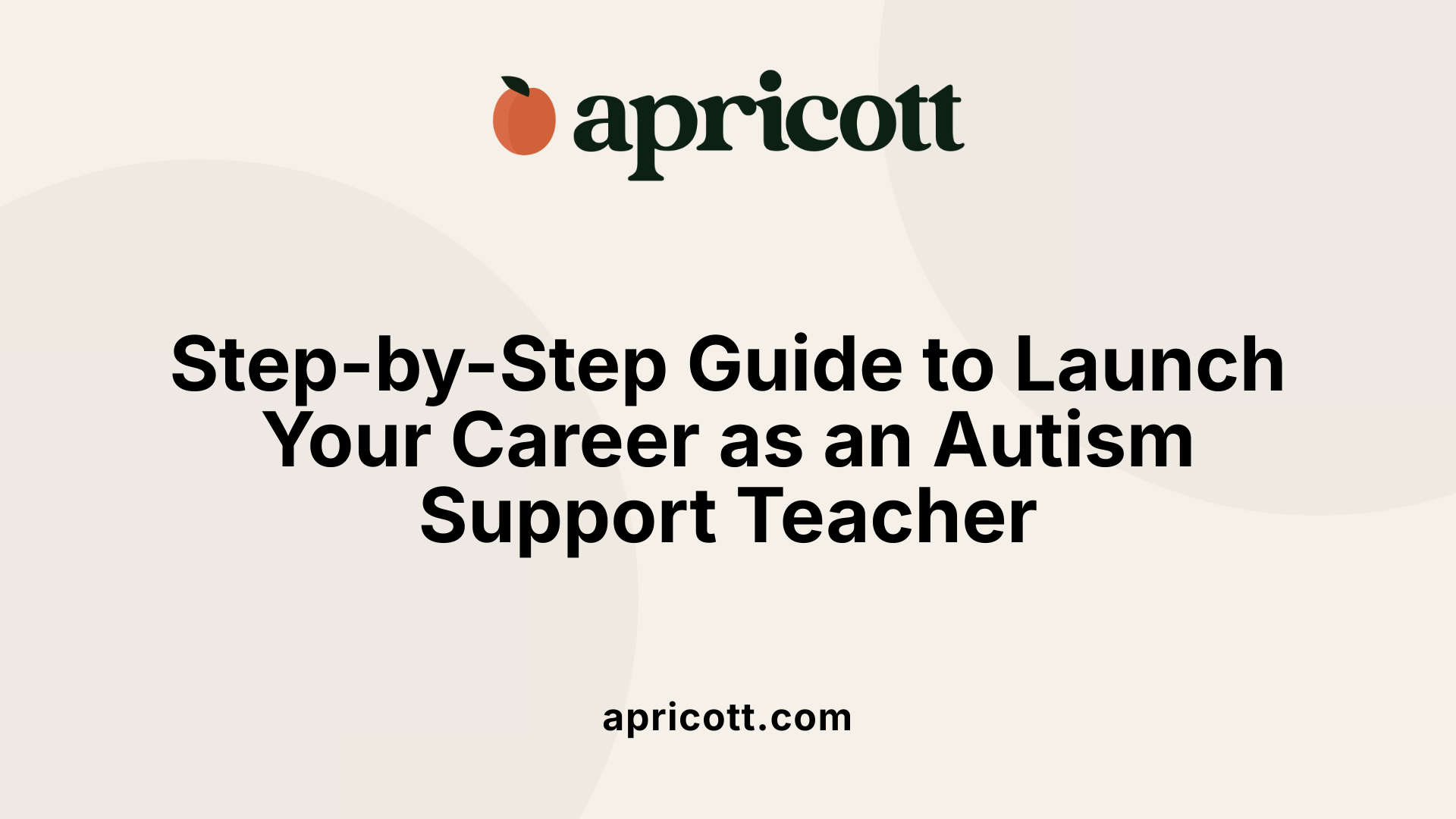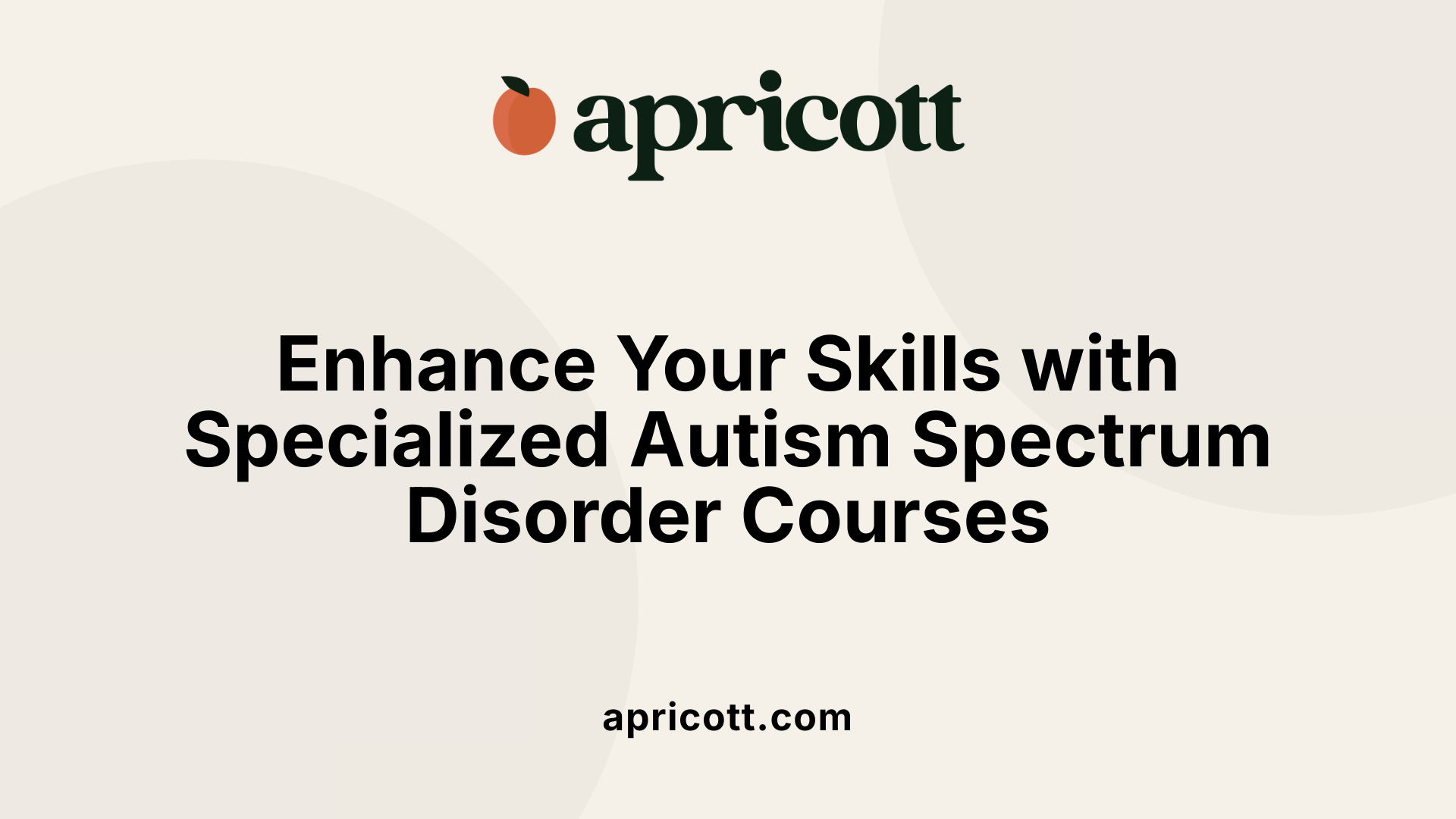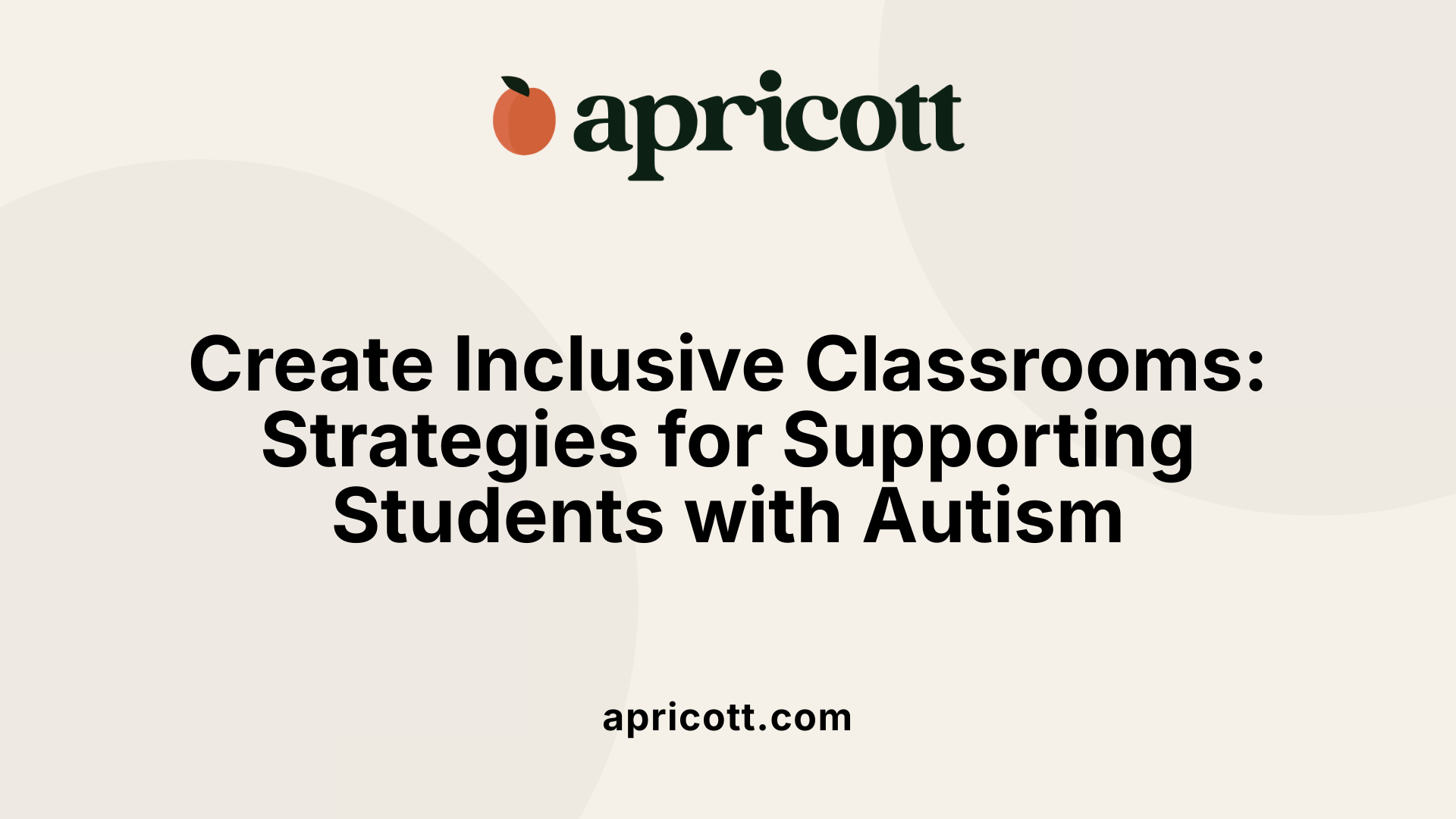December 2, 2025
Supporting Autistic Learners: A Guide to a Rewarding Career
Teaching students with autism requires specialized knowledge and skills. This comprehensive overview will explore the educational requirements, competencies, career pathways, certification processes, and professional development opportunities available for those interested in becoming autism support teachers. Whether you’re just starting or looking to advance, understanding these elements is crucial to making a meaningful impact in the lives of autistic learners.

To pursue a career as an autism support teacher, prospective educators generally need to meet specific academic criteria. The starting point is usually obtaining at least a bachelor's degree in special education, psychology, or a closely related field. This foundational education prepares teachers with essential knowledge about learning differences and behavioral management.
In many states, a master's degree in these areas is either preferred or required for higher certification levels and more advanced positions. A master's qualification often enhances teaching skills and deepens understanding of autism support strategies.
State licensure is a crucial component of becoming a certified autism teacher. Candidates must pass a licensing exam designed to evaluate their knowledge of special education practices and behavioral interventions. Additionally, completing a student teaching internship under a licensed teacher, typically lasting several months, is a standard requirement.
Beyond basic licensure, many regions offer endorsements or certifications focused on autism. These endorsements involve coursework and practical training in evidence-based practices (EBPs), equipping teachers with specialized skills to serve students with autism effectively.
For those transitioning into teaching from different careers, alternative certification programs like GaTAPP (Georgia Teacher Academy for Preparation and Pedagogy) provide a pathway. These programs enable individuals with relevant degrees or experience working with autistic individuals to become certified teachers, often through a combination of coursework and supervised teaching.
Overall, the process combines formal education, practical experience, and additional certifications tailored to autism support. Continuous professional development and certification renewals are encouraged to stay updated with the latest practices and evidence-based interventions.
Autism support teachers play a crucial role in fostering inclusive and effective learning environments for students on the autism spectrum. To succeed, teachers must develop a diverse set of skills that address both educational and emotional needs.
Effective communication skills are fundamental. Teachers need to convey information clearly and empathetically to students, families, and interdisciplinary team members. Patience and attentiveness are equally important, as students with autism often require personalized approaches and consistent support.
Understanding autism spectrum disorder (ASD) and evidence-based practices (EBPs) is essential. Teachers should be familiar with interventions such as structured teaching, visual supports, social skills training, and behavioral management techniques grounded in research.
Behavior management skills are vital to maintain a safe and conducive learning space. This includes implementing positive reinforcement strategies and managing challenging behaviors with sensitivity.
Collaboration is another key area. Working closely with families, special educators, therapists, and other support staff ensures that educational strategies are consistent and tailored to each student's needs.
Planning individualized education programs (IEPs) and adapting curricula requires strong organizational skills, creativity, and a keen attention to detail. Continuing professional development helps teachers stay updated with new research and methods.
In addition to technical skills, qualities like curiosity, adaptability, organization, and a positive attitude significantly contribute to effective support. By combining these competencies, autism support teachers can provide meaningful, personalized education that promotes growth and inclusion.
For detailed insights on the skills and competencies necessary, a search using the phrase 'Skills and competencies for autism support teachers' can offer additional resources and professional development opportunities.

Individuals who aim to become autism support teachers usually begin with obtaining a bachelor's degree in elementary education, special education, or a related field. This foundational education provides essential knowledge and skills needed for working with diverse student populations.
After completing their degree, aspiring teachers must earn a state-issued teaching license. This process generally involves passing a licensing examination, such as the Praxis, and completing a student teaching internship that lasts from three to twelve months under the supervision of a licensed teacher.
In many states, having a master's degree focusing on autism spectrum disorders or related coursework can improve job opportunities and potential salary. Some regions may require or prefer candidates to hold advanced degrees for certification or special roles.
Gaining practical experience through internships, volunteering, or hands-on work with autistic individuals allows future teachers to develop relevant skills. These experiences also help fulfill certification prerequisites.
Additional endorsements, such as the autism endorsement in Texas, serve as a mark of specialized training. These endorsements, recognized by state education agencies, often include participation in webinars, artifact submissions, and involvement with professional learning communities.
Preparation for this career path may also involve participating in professional development programs. Organizations like the Autism Circuit Academy (ACA) offer free or affordable training levels that focus on evidence-based practices (EBPs) for autism, along with CEU credits that can support ongoing education.
For professionals interested in broader certification, organizations such as IBCCES provide research-based programs culminating in certifications like the Certified Autism Specialist (CAS). These credentials focus on autism awareness, behavior management, and collaboration skills.
In summary, entering the autism support teaching field involves a combination of formal education, certification, practical training, and continuous professional development. These steps help ensure educators are well-equipped to meet the needs of students with autism.
| Step | Description | Additional Notes |
|---|---|---|
| Education | Bachelor's degree in education or related field | Required for all states |
| Licensing | Pass exams like Praxis, complete student teaching | Varies per state |
| Advanced Degrees | Master’s focusing on autism | Enhances prospects |
| Practical Experience | Internships, volunteering, supervised teaching | Essential for certification |
| Special Endorsements | Autism endorsement programs | Recognized by TEA and other agencies |
| Professional Development | Continuous training via programs like ACA or IBCCES | Supports ongoing career growth |
To become qualified as an autism support teacher, professionals generally follow a clear pathway involving education, certification, and specialized training. First, they must complete a degree in education, psychology, or a related field. Most states require a minimum of a Bachelor’s degree in Education to become a special education teacher. Some regions prefer or mandate a Master’s degree for autism support roles.
Following educational requirements, prospective teachers must obtain state licensure or certification, which includes passing licensing exams and background checks. For instance, Georgia requires passing the GACE assessment for certification. Certification processes often include completing a student teaching experience under a licensed educator, which typically lasts between three and twelve months.
Special endorsements in autism are available through various programs. The Autism Circuit Academy (ACA) offers a free endorsement program recognized by the Texas Education Agency (TEA). This program involves participating in webinars, submitting artifacts demonstrating their skills, and engaging in a professional learning community. These activities help educators acquire evidence-based practices (EBPs) and are credited for Continuing Education Units (CEUs). While the endorsement confirms training completion in autism-specific practices, it does not serve as an official state license.
Additionally, organizations like IBCCES provide certification programs such as the Certified Autism Specialist (CAS) and Autism Certificate (AC). These certifications focus on skills like developing individualized education plans, behavior management, and parent communication. The process involves completing designated training, passing an exam, and paying fees that range from $295 to $495. Certified professionals must renew their credentials every two years, often by completing additional CE hours.
Certification by IBCCES and similar organizations is particularly beneficial for roles like school psychologists, behavior specialists, and support staff, all working to better support students with autism.
Competency assessments usually involve a combination of coursework, practical experience, and exams. Candidates must demonstrate their ability to develop and implement effective, evidence-based interventions tailored to individual student needs. During training programs, educators participate in real-world activities, case studies, and simulated environments to hone these skills. Credentialing organizations often require proof of experience, such as documented work with autistic individuals, to ensure readiness for professional practice.
Many programs stipulate continuing education hours—typically 14 or more CE credits—to maintain certification status, ensuring that educators stay current with evolving best practices. Overall, these assessments guarantee that professionals possess both the theoretical knowledge and practical capabilities necessary for effective autism support.
There are numerous options for autism-related training, certification, and professional development designed for educators, specialists, and support staff. These programs help increase understanding, improve skills, and promote effective teaching strategies for students with autism.
One prominent example is the Autism Circuit Academy (ACA), which offers comprehensive professional development programs focused on evidence-based practices (EBPs). These programs are free for educators working within Texas local education agencies and include activities such as webinars, artifact submission, and membership in a professional learning community. Completing ACA's endorsement signifies training in EBPs for autism and earns recognition from the Texas Education Agency (TEA) for Continuing Education Units (CEUs). However, it's important to note that this endorsement is not a formal state license or certification.
Another significant provider is the International Board of Credentialing and Continuing Education Standards (IBCCES). They offer online certification programs like the Certified Autism Specialist (CAS) and Autism Certificate (AC). These courses focus on autism overview, behavior management, IEP development, early childhood identification, parent communication, and addressing comorbidities. To qualify, professionals typically need relevant degrees, experience, or currently provide services to autistic individuals. The certification process includes training, an exam, and requires renewal every two years. Fees range from $295 to $495.
Online learning platforms also provide self-paced courses on behavioral interventions such as Discrete Trial Training and Naturalistic Developmental Behavioral Interventions (NDBI). These platforms, like Autism Internet Modules (AIM), make it easier for educators and support staff to stay up to date with current best practices.
In addition to online resources, many states require teachers to earn certification to support students with autism. Requirements vary but often include completing a Bachelor’s degree in Education, gaining teaching experience (sometimes via alternative programs such as Georgia’s GaTAPP), passing a licensing exam, and undergoing a background check. Additional qualifications such as a Master’s degree may be preferred in some states.
Ongoing professional development is vital. Many programs, including ACA and IBCCES certifications, offer multiple levels—from foundational training to advanced courses serving as continuing education credits. These initiatives ensure educators remain informed about the latest interventions and strategies.
| Program Provider | Course Focus | Certification Type | Cost Range | Recognition/Notes |
|---|---|---|---|---|
| Autism Circuit Academy | Evidence-based practices, webinars, artifacts | Endorsement by TEA, CEUs | Free (for Texas educators) | Not a state license, professional recognition |
| IBCCES | Autism awareness, behavior, IEP development, communication | CAS and AC certifications | $295 - $495 | Credential valid for two years, broader professional use |
| Online Platforms (e.g., AIM) | Behavioral interventions, training modules | None (self-paced) | Varies | Self-directed learning, supplemental training |
These diverse programs and certifications play a crucial role in equipping educators and professionals with the skills necessary to support students with autism effectively. Ongoing education ensures that support staff stay current with evolving strategies and best practices, ultimately benefiting the students they serve.

For educators and professionals seeking to deepen their understanding and skills in working with individuals on the autism spectrum, a variety of specialized courses and training programs are available. One highly recommended foundational course is "Many Faces of Autism," which provides essential insights into ASD characteristics, common misconceptions, and an overview of evidence-based practices.
Evidence-based modules are often tailored to different age groups, such as toddlers, school-age children, and transition-age individuals. These courses focus on behavioral interventions, social skills development, and effective communication methods tailored for each developmental stage.
Online platforms like Autism Internet Modules (AIM) offer self-paced learning with a wide array of lessons on specific interventions. These cover strategies such as Pivotal Response Training (PRT) and Naturalistic Developmental Behavioral Interventions (NDBI), both of which are backed by research and often provide Continuing Education Credits for professionals.
Further educational opportunities include accredited university courses from prominent institutions like Yale University or Utrecht University. These courses delve into topics including Applied Behavior Analysis (ABA), autism diagnosis processes, and family-centered support approaches. Many of these programs are designed to be flexible, allowing learners to choose beginner or advanced levels to suit their existing expertise.
Overall, professionals interested in ASD should consider a blend of introductory courses that provide foundational knowledge and specialized modules emphasizing intervention techniques. Participation in these programs helps educators meet certification requirements and improves the quality of support provided to students with autism.
Below is an overview table summarizing the main types of training available:

Creating an inclusive classroom for students with autism involves adopting specific strategies and policies that meet their unique needs. Teachers can start by incorporating visual supports, such as picture schedules and communication boards, to help students understand daily routines and expectations. Structured routines and clear instructions minimize confusion and support independence.
Behavior support plays a crucial role. Using evidence-based practices like positive reinforcement encourages desirable behaviors and helps manage challenging behaviors effectively. Developing individualized behavior plans, tailored to each student's needs, ensures consistent support across settings.
Collaboration is vital. Teachers should work closely with families, speech-language pathologists, behavior analysts, and other specialists to craft comprehensive support strategies. Regular communication helps align goals and therapies, creating a unified approach.
School policies that promote inclusivity are just as important. Implementing universal design for learning (UDL) principles and providing staff training on autism awareness foster a school culture of acceptance and diversity.
Further improvements can be achieved through ongoing professional development, especially training focused on reducing sensory overload and accommodating various learning styles. These efforts help cultivate a classroom environment where all students feel valued and supported.
| Strategy | Description | Expected Outcome |
|---|---|---|
| Visual supports | Pictorial aid for routines | Clarity and independence |
| Structured routines | Consistent daily schedule | Reduced anxiety |
| Evidence-based behavior plans | Positive reinforcement techniques | Better behavior management |
| Staff training | Autism-specific professional development | Increased staff competency |
| Family collaboration | Regular communication with families | Consistent support |
| Inclusive policies | Adoption of UDL principles | School-wide acceptance |
Organizations such as IBCCES are vital in advancing autism education by offering specialized training and certification programs rooted in research and best practices. These programs are designed for educators, support staff, and related professionals who work with individuals on the autism spectrum.
IBCCES provides a range of certifications, including the Certified Autism Specialist (CAS) and Autism Certificates (AC). These credentials cover important topics such as autism overview, behavioral strategies, communication techniques, early childhood identification, and parent collaboration. Achieving these certifications not only boosts professional knowledge but also offers recognition, helping educators meet ongoing certification or licensure requirements.
An essential aspect of IBCCES’s approach is fostering ongoing professional development. Through webinars, online courses, and renewal processes, they ensure that professionals stay updated with the latest evidence-based practices, interventions, and research in autism support. This continuous learning helps improve teaching strategies and enhances support quality for students.
By supporting the professional growth of educators and support staff, IBCCES plays a key role in improving educational outcomes for students with autism. Their focus on research-backed training reinforces the importance of continuous education to adapt to evolving practices and ensure effective support for individuals on the spectrum.
| Program Focus | Certification Offered | Key Topics Covered | Continuing Education Requirement | Cost Range |
|---|---|---|---|---|
| Research-based autism training | Certified Autism Specialist (CAS), Autism Certificates | Autism overview, behavior management, communication, early ID, parent communication | Renewal every 2 years | $295 - $495 |
| Staff and educator development | Various online modules, courses | Evidence-based strategies, intervention techniques | Ongoing CE hours recommended (14+ hours) | Included or additional fee |
Organizations like IBCCES thus serve as a bridge to ensure professionals are equipped with the latest knowledge and skills, fostering more effective support strategies for individuals with autism across educational settings.
Becoming a competent and compassionate autism support teacher involves a combination of formal education, specialized training, ongoing professional development, and genuine empathy. By understanding the educational pathways, certifications, and skill requirements, aspiring educators can confidently navigate the process. Leveraging resources such as the Autism Circuit Academy, IBCCES, and online learning platforms equips teachers with the latest methodologies to support students with autism effectively. With dedication and continual growth, educators can build inclusive environments that foster independence, social skills, and academic success for all students.